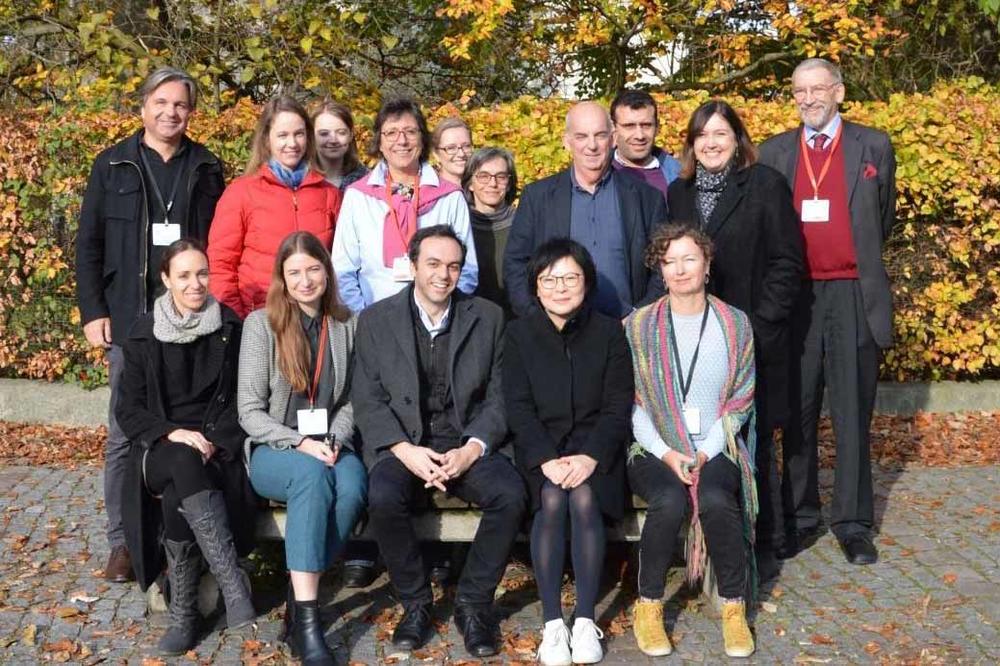International Workshop: “Diasporas and Homeland Governance – Decentering the State as an Analytical Category”
Participants of the workshop "Diaspora and Homeland Governance"
Image Credit: SFB 700/Sophie Frossard
On 03. and 04. November 2017 the Collaborative Research Centre (SFB) 700 – “Governance in Areas of Limited Statehood” hosted a workshop with international guests on the topic of “Diasporas and Homeland Governance – Decentering the State as an Analytical Category” at the Freie Universität Berlin, which was led by Catherine Craven (SOAS/FU Berlin).
News from Nov 29, 2017
Overall, 21 scientists from across Europe, North America as well as South and Central Asia attended the workshop, to present and discuss their work on “Diasporas and Homeland Governance” from a range of disciplinary perspectives. Across several panels, the speakers gave short presentations on their research papers and findings, which was then followed by individualized feedback and an open discussion round.
The workshop explored two key questions: To what extent are state-centric research models still useful for studying diaspora governance? And what alternative concepts and schemes can we come up with? The search for new analytical perspectives in diaspora governance research is based on the finding that state-centric analyses are inadequate to investigate the “in-between space” inhabited by diasporas. There is also an urgent need to unsettle existing Western research models, for the study of transnational phenomena and more generally.
The first panel dealt with the non-linear relationships between diasporas and their countries of origin. Speakers presented their research on diaspora contributions to governance in the fields of development and education, in Armenia and Cape Verde respectively. This was followed by a panel on the changing meanings of territoriality and non-state governance constellations under conditions of transnationalism. Here participants discussed how diasporas, through their mobilization and governance activities beyond the national and international level, challenge the logic of the Westphalian nation-state.
On the next panel, participants discussed the (meta-)governance and regulation of diasporas through emigrant policies and diaspora engagement strategies. Especially in the field of development, it has become evident that countries of origin, donor countries and international organizations such as the World Bank are becoming increasingly interested in benefiting from diaspora capacities and networks.
The second workshop day began with presentations on diaspora governance in (post-)conflict spaces, where speakers reported on diaspora linkages between Afghanistan and Germany, as well as Somalia and Sweden. The final panel, focused on decentering the state by way of imagining sovereignty and democracy in a post-national world. In their presentations, the speakers problematized diaspora governance via the “boundary problem” in democratic theory and the creation of a utopian transnational governance space.
Ultimately, participants of the workshop concluded that in the emerging research field of diaspora governance questions remain, which require a deeper analysis of and engagement with the state as an analytical category. Prof. Dr. Tanja A. Börzel (FU Berlin) pointed out potential overlaps between research done in the SFB 700 on the effectiveness and legitimacy of external governance provision with further investigation of diaspora governance, which will be elaborated in a forthcoming working paper.
Workshop participants: Fiona B. Adamson, Tanja A. Börzel, Catherine Craven, Veysi Dag, Tsypylma Darieva, Michael Daxner, Anke Draude, Maria Elo, Alexandra Délano Alonso, Helge Jörgens, Nauja Kleist, Luisa Linke-Behrens, Antía Mato Bouzas, Dr Indianna D. Minto-Coy, Harris Mylonas, José Maria Neves, Silvia-Lucretia Nicola, Luicy Pedroza, Thomas Risse, (Margaret Walton-Roberts), Nicholas Van Hear, Ashwini Vasanthakumar.

